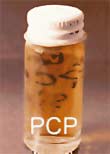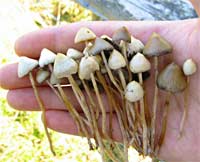Hallucinogens
Hallucinogens are psychedelic drugs. These drugs affect a person's perception,
sensation, thinking, self awareness, and emotions. Examples of these drugs are LSD,
PCP, mescaline, and DMT. Some of these hallucinogens come from natural sources. For
example, mescaline comes from peyote cactus. However, others like LSD are synthetic
and/or manufactured.
 LSD is lysergic acid which is found on ergot, a fungus that grows on rye and other grains.
LSD was first discovered in 1938 and was found to be odorless, tasteless, and colorless.
LSD comes in tablets, capsules, paper, and occasionally in liquid form. The drug is then
consumed and absorbs into the system. The most frequent method of introduction is by
absorption onto paper tablets, and then placing those tablets one's mouth and allowing the
drug to be absorbed into the body.
LSD is lysergic acid which is found on ergot, a fungus that grows on rye and other grains.
LSD was first discovered in 1938 and was found to be odorless, tasteless, and colorless.
LSD comes in tablets, capsules, paper, and occasionally in liquid form. The drug is then
consumed and absorbs into the system. The most frequent method of introduction is by
absorption onto paper tablets, and then placing those tablets one's mouth and allowing the
drug to be absorbed into the body.
Mescaline, as stated previously, comes from the peyote cactus. The effects of mescaline is
the same as LSD but less intense as the drugs is not as strong as LSD. The method of
introduction into the body is usually by smoking or swallowing tablets.
PCP is most commonly referred to as "angel dust". PCP is manmade and was created as an
anesthetic but was taken off the market, as it was found to cause hallucinations. PCP can
be swallowed, smoked, sniffed, or even injected. It is not uncommon to find marijuana
laced with PCP.
 The effects of hallucinogens, except PCP, are unpredictable. The effects normally depend on
the users personality, mood, expectations, and the amount of the drug consumed. The effects
of these drugs do not normally kick in until approximately 30-90 minutes after introduction
into the body. The effects on the body are dilated pupils, high body temperature, increased
heart rate, increased blood pressure, excessive sweating, loss of appetite, insomnia, dry
mouth, and tremors. The user may experience rapid and several emotion changes. The user
loses his sense of time. Sensations experienced by users may get screwed up. Users often
complain about hearing colors and seeing sounds. These effects may lead users to fall into
a panic attack. Users may also experience what is known as a "bad trip". During these
"bad trips", the user may experience panic, confusion, suspiciousness, anxiety, feelings
of being helpless, and loss of control. These drugs can also cause long term and last flashbacks,
where a user after no longer using the drugs has occasions where they fall back into an
intoxicated state, experiencing these affects all over again.
The effects of hallucinogens, except PCP, are unpredictable. The effects normally depend on
the users personality, mood, expectations, and the amount of the drug consumed. The effects
of these drugs do not normally kick in until approximately 30-90 minutes after introduction
into the body. The effects on the body are dilated pupils, high body temperature, increased
heart rate, increased blood pressure, excessive sweating, loss of appetite, insomnia, dry
mouth, and tremors. The user may experience rapid and several emotion changes. The user
loses his sense of time. Sensations experienced by users may get screwed up. Users often
complain about hearing colors and seeing sounds. These effects may lead users to fall into
a panic attack. Users may also experience what is known as a "bad trip". During these
"bad trips", the user may experience panic, confusion, suspiciousness, anxiety, feelings
of being helpless, and loss of control. These drugs can also cause long term and last flashbacks,
where a user after no longer using the drugs has occasions where they fall back into an
intoxicated state, experiencing these affects all over again.
The affects of PCP on the body are similar to those as LSD and mescaline, but may also cause
dizziness and numbness and are more predictable. With large amounts, the user may experience
drowsiness, convulsions, and coma. These symptoms can lead all the way up to death. Users
personally may exhibit signs of violence and bizarre behavior. These behavior changes have
caused death to users of PCP because of their bizarre behavior. The effects of PCP can last
from days to weeks. Long term users may experience memory difficulties and speech problems.
Long term users may also start hearing voices or sounds that are non existent. Users of these
drugs, trying to withdraw from use, should seek professional medical treatment.


